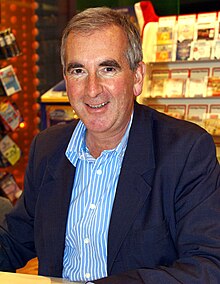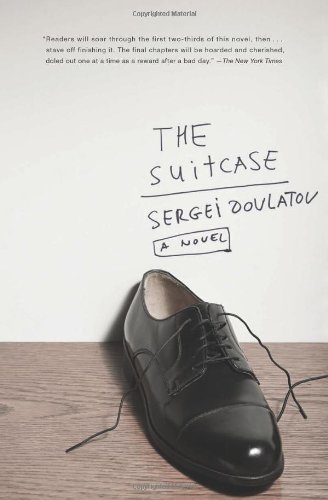The Accidental Tourist
by Anne Tyler
Penguin, 355 pages
Some years ago, following a rather bad break-up, I stumbled upon The Accidental Tourist in the dollar bin of a used bookstore. I don't know why I picked it up - I had never read Anne Tyler before and had never seen the movie. But it might have had something to do with these lines from the start of Chapter Two: "After his wife left him, Macon had thought the house would
seem larger," writes Tyler. "Instead he felt more crowded. The windows
shrank. The ceilings lowered. There was something insistent about the
furniture, as if it were pressing in on him."
The story of Macon Leary, the abandoned husband, naturally spoke to me - I too felt I had been abandoned - but before long Tyler's whimiscal plot, charming cast of characters and unintrusive prose meant as much to be as the question of whether Macon Leary would return to the woman who had left him or move forward with the eccentric Muriel Pritchitt.
Thursday, September 13, 2012
Sunday, June 10, 2012
An Ode to Robert Harris
8 works of fiction, 5 works of non-fiction
You won't find Robert Harris sitting in that deadly of all sections known as Literary Fiction, at least not in America. If his books show up anywhere, it's either in the category of General Fiction or that risky sub-genre known as "Thriller". You can find him in the airports and pharmacies if not proudly displayed on the bestseller's table at your local book emporium. For this reason, highbrow literary know-it-alls generally refer to him as their guilty pleasure - you won't find The Fear Index at your local book club, where everyone is going gaga over the sequel to Wolf Hall. And you probably won't find some English grad student doing a thesis about the function of metaphor in Fatherland. But this is one highbrow literary know-it-all who's stepping out of the closet. I'm making this plea to book clubs and grad students everywhere: Robert Harris is a pleasure and there's no need to feel any guilt.
Monday, May 7, 2012
 Same Time, Next Year
Same Time, Next Year
Same Time, Another Year
by Bernard Slade
Samuel French. 1975 / 1996.
I'm obsessed with a thirty-five year old play and I don't know why. Bernard Slade's 1975 Broadway success has been wildly successful, garnering international productions, a movie with Alan Alda and Ellen Burstyn, a musical and a sequel. I have no doubt it's Slade's "annuity play", meaning he probably make a comfortable living off the royalties - the show is a staple of community theatre and summer stock. And now, after catching the latest production here in Montreal, the play won't stop its ceaseless march through my brain.
Tuesday, April 10, 2012
Grand Hotel by Vicki Baum
Long out of print (even the reprint is out of print), Vicki Baum's Grand Hotel is mostly forgotten except to librarians, famed only to lovers of old films (two versions were made) and musicals (a Tommy Tune directed version swept Broadway in 1989). The novel itself seems to have been swept from our cultural memory and this is unfortunate: it remains a tightly conceived story of six disparate characters and the way their fates intertwine over the course of two days at the eponymous hotel. Both story and prose (translated by Basil Creighton) survive the ages and in some cases remain surprisingly relevant - most especially in the story of Preysing, the manager of a company, who is faced with the decision of whether or not to succumb to dishonest business practices just to make a buck.
Sunday, March 25, 2012
An Improvised Life: A Memoir
Da Capo Press, 201 pages.
Alan Arkin, if you believe his father, knew he was going to be an actor at the age of five, a fact which would seem to belie the title of his book: despite his claims, there's the distinct sense that his professional life went more or less according to plan. An award-winning actor and director, Arkin is best known today for playing old curmudgeons, such as in Little Miss Sunshine and The Change-Up (he also has a cameo in The Muppets). But he's appeared in over 80 films and has a theatrical track record that most actors would with envy. No doubt about it, Arkin's life doesn't truly seemed to have been improvised at all: he made a plan when he was five and stuck to it. Or at least that's how it seems in An Improvised Life, which skips over almost all of Arkin's personal struggles and focuses entirely on his philosophies on acting and a life in the arts. It's an enjoyable read if you're an artist; anyone else, I suspect, will find it (amazingly) lacks drama.
Saturday, March 17, 2012
Priceless
How I Went Undercover to Rescue the World's Stolen Treasures
Robert K. Wittman with John Shiffman
Crown Publishers, 324 pages.
A book that should be coming soon to a TV screen near you, Priceless is a fearless memoir that is begging for adaptation - and authors Robert Wittman and John Shiffman have even provided writers with at least twelve episodes for the first season. The story of the founder of the FBI Art Crime Team, Priceless succeeds as both crime drama and personal memoir, with Wittman emerging as the classic hero driven by a need for personal redemption. It also serves as a passionate celebration of art and its place in human culture.
Saturday, March 10, 2012
Frank
by Annette Dunlap
Excelsior Editions, 2009. 195 pages.
More an extended encyclopedia entry then a comprehensive biography, Annette Dunlap's survey of the life of America's youngest first lady sketches the life of an intriguing figure without ever going too far below the surface. Frances "Frank" Cleveland is a barely remembered First Lady, overshadowed by the tragic glamor of Jacqueline Kennedy, the social activism of Eleanor Roosevelt and even the lunacy of Mary Todd Lincoln. But Frank married Cleveland in more ways then one and as his second term was considered a failure best forgotten, so too has Frank beenexiled from thought. Some historians have tried to rehabilitate Cleveland's reputation recently, so its not surprising that Frank would be resurrected as well. Dunlap herself clearly hopes to champion Frank but her polite narrative is far too brief to ever allow the reader a chance to form their own opinion.
Sunday, March 4, 2012
Tension City:
Inside the Presidential Debates, from Kennedy-Nixon to Obama-McCain
by Jim Lehrer
Random House, New York, 2011. pp 209.
Given that Jim Lehrer has had a front row seat to eleven U.S. presidential debates, you wouldn't be wrong to expect more from Tension City, a slim volume that works as an appetizer when it should have been a meal. The metaphor is apt since, like a good croquette, Tension City is easy to digest and possible to finish in a single sitting. As a man who had a worm's eye view of some significant political moments, Lehrer had the opportunity to supply some deft political analysis, both on the art of debating and the evolution of the televised debate from political confrontation to its current form as orchestrated entertainment. Instead, Lehrer seems content to supply anecdotes and only a few juicy facts as he gives us a whirlwind tour across fifty years of debating history.
Thursday, February 23, 2012
Cognition in the Globe: Attention and Memory in Shakespeare’s Theatre
by Evelyn B. Tribble
Palgrave MacMillian. New York, 2011. 200 pp.
Theatre practitioners accustomed to dramatic analysis of Shakespeare’s work – what does Macbeth want? how to stage the moving of Birnam Wood? – have a fascinating new viewpoint in Evelyn Tribble’s Cognition in the Globe, one of the more recent additions to Palgrave’s series Cognitive Studies in Literature and Performance. In concerning herself with the question of how early theatre companies carried the mnemonic load associated with performing several new plays a month, Tribble has created a treatise that sheds light on the historic even as it provides new insights to those producing theatre today.
Sunday, February 19, 2012
Destiny of the Republic
A Tale of Madness, Medicine and Murder of a President
At once an engaging piece of Americana and an exploration of the frightening world of 19th century medicine, Candice Millard's re-telling of the assassination of President James Garfield explores the story from more than a few surprising angles. Others have chartered this course before (see Kenneth Ackerman's 2004's Dark Horse, discussed here) but Millard stakes her claim on the subject by framing her narrative around several characters whose place in the story has heretofore been as members of the supporting cast.
Saturday, February 11, 2012
Out of Oz
by Gregory Maguire
Harper Collins, 563 pages.!! This review contains spoilers !!
Although one has to credit Gregory Maguire for his imagination, devotion and skill - his brains, heart and courage, as it were - it would be a tough job to recommend Out of Oz to anyone but the most devoted fans. The book is the final volume of a massive reworking of the Oz mythology dubbed The Wicked Years, a long, complicated saga about war, politics and love that have earned Maguire comparisons to J.R.R. Tolkien, Robert Jordan and other creators of the sprawling fantasia. But Out of Oz, more than any of the three books that came before it, seems to strain under Maguire's literary efforts. Everything is a little too labored, especially the narrative, which is a meandering timeline of events that spans the years but leaves the characters themselves lost in its wake.
Thursday, January 12, 2012
The Suitcase by Sergei Dovlatov
Counterpoint Press, 136 pages. The government of the Soviet Union (1922 - 1991) produced an army of disasters in their day, but no one can ever fault them for giving us Sergei Dovlatov. Born just after the Nazis invaded Mother Russia, Dovltaov would survive the war and go on to be a soldier, prison guard and journalist before escaping to the United States. Anticipating "creative non-fiction" years before the term was ever invented, Dovlatov wrote in a terse, comical style in the voice of a narrator created in his own image. The Suitcase is no exception. A wry collection of short stories about a Russian named Sergei - who was once a prison guard, worked as a journalist and emigrated to the States - The Suitcase merrily blurs the genres to create a work that is entirely unique.
Subscribe to:
Comments (Atom)








